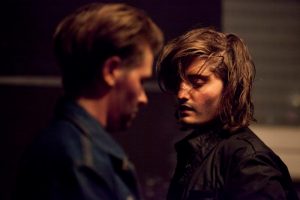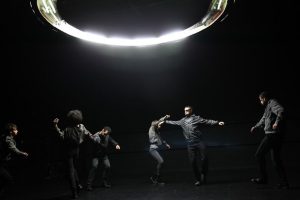Drie mongolen die Mongolen spelen. Dschingis Khan, de openingsvoorstelling van Something Raw, is provocerend en consequent. Met deze voorstelling van het Duitse theatercollectief Monstertruck, of het eveneens uit Berlijn afkomstige Man Power Mix van Sheena Mcgrandles en Zinzi Buchanan, doet het festival Something Raw zijn naam eer aan.

Something Raw is een festival waarin de Amsterdamse theaters Frascati, De Brakke Grond en Veem samenwerken. Het toont sinds jaar en dag opkomende experimentele performance kunstenaars en theatermakers uit het internationale veld. Centraal staat ook dit jaar de vraag wat theater en performance kunnen betekenen in een tijd die door oprukkende technologie en cultuurclashes wordt getekend. Het posthumanistische thema lijkt niet op alle voorstellingen van toepassing, maar het is een bruikbaar uitgangspunt.
Dschingis Khan is schrijnend en problematiseert. Drie acteurs met het syndroom van Down worden als ethnische Mongolen opgevoerd, hun zogenaamde tradities samengevat in klinkende clichés, die natuurlijk nergens op slaan. De toeristen-industrie die iedere uithoek van de wereld tot consumptiegoed heeft gemaakt, met alle gevolgen van dien, is maar een zijstraat in deze uiteindelijk heel kwetsbare voorstelling.
Dschingis Khan hanteert de methode van toneel op toneel listig. Het regime ter plekke afgedwongen door regie en techniek, spiegelt de dominantie van het Westerse denken en handelen, dat pretendeert verder te zijn en beter te weten, eigen onkunde en onmacht vlijtig projecterend op niet-Westerse ‘anderen’.

De drie acteurs zal het verder worst wezen. Zij spelen met genoegen wanneer ze daarvoor de ruimte krijgen. Eten, drinken, sex en lieve aandacht spelen dan een grote rol. Onbezwaard maken ze elkaar uit voor aap. En dat is de meesterzet in Dschingis Khan, dat het ongelimiteerd projecteren van onmacht en onbegrip, verhuld als normen en waarden waar iedereen aan zou moeten geloven, wordt vervangen door de realiteit, het oprechte engagement en de zachtaardige gebaren van drie hoegenaamd minder valide mensen. Het verschil in EQ wordt niet weggemoffeld, de acteurs doen hun eigen show, ventileren hun eigen waarden, delen dat met het publiek. Geen heropvoeding hier uit naam van de beschaving, geen betutteling ook, maar werkelijke aandacht en een kritische blik op wat normaliter onder beschaving wordt verstaan.
Een andere tendens is een opmerkelijke hang naar modernisme, heldere tegenstellingen, klare symboliek. Voorstellingen als Antithesis, the future of the image van de Belg Michiel Vandevelde en Kat Válastur’s Ah! Oh! A contemporary ritual stellen de wereld al te overzichtelijk voor en doen daardoor wat krampachtig, haast conventioneel aan.

Het hedendaagse ritueel van Válastur bijvoorbeeld grijpt in veel terug op de modern dans van de vorige eeuw. De beweging staat in dienst van een idee, wordt als het ware geïnstrumentaliseerd. Het idee, een doemscenario gebaseerd op de tegenstelling tussen individu en groep, wordt in alle details van de voorstelling bevestigd. Nergens is een steekje los, nooit wordt er een doodlopend straatje bewandeld. Hoewel de koppeling van ingehouden adem en bolle wangen aan actie een intrigerend uitgangspunt vormt, werkt het mechanisme vooral als illustratie van het idee en niet als een motor voor mutatie en transformatie. De controle is voortreffelijk en daarmee is de voorstelling ook vreselijk voorspelbaar. De dansers werken zich in het zweet, stoere jacks en dito surround sound zorgen voor een hippe vibe, maar dat ene post-industriële, post-apocalyptische beeld komt mij echt te bekend voor. Er worden geen vragen gesteld, geen betrekkelijkheid ontwikkeld, de choreograaf laat een ei, en de dansers doen hun best deze opvatting over humaniteit in te lossen. De voorstelling zou zo bij een modern dansgezelschap in première kunnen gaan.

Er is ook ‘nog niet helemaal af’ werk te zien tijdens Something Raw. Casca’s D’Ovo van Lander Patrick & Jonas Lopes uit Lissabon maakt indruk door de zorgvuldigheid waarmee lijfelijk gevoel en formele compositie op een speelse manier worden gecombineerd. Geblindoekt voeren de twee mannen een virtuoos pas-de-deux op, waarin rake klappen vallen. Het ijzersterke en minimalistische uitgangspunt wordt jammergenoeg niet tot het einde toe doorgezet. De afloop van de voorstelling is een tableau vivant dat een bloot homofiel stel in omarming tussen andere ‘hele gewone’ mensen plaats, figuranten die stofzuigen, met een AH tas binnenwandelen of turnoefeningen doen. Het is een statement waar niets mis mee is, maar als scene lijkt het tableau in een ander stuk thuis te horen.
En dat is het goede aan deze Something Raw: het toont niet alleen ruig, maar ook redelijk jong werk. Het festival betrekt zo toeschouwers bij actuele vragen en voorstellen vanuit verschillende plekken in Europa, en zorgt er voor dat internationaal talent naar Amsterdam komt. En dat is broodnodig, want het internationale experimentele theater aanbod is mager geworden in de hoofdstad. Dat gaat niet alleen om financiën, maar ook om aandacht, tijd nemen, zorgvuldig internationale allianties aangaan en visie ontwikkelen, kop uit durven steken, kunstenaars de ruimte geven voordat het doorgewinterde makers zijn – en dat ontbreekt op veel plekken in Nederland, niet alleen in Amsterdam.
Vrijdag 12 en zaterdag 13 februari zijn er nog volop voorstellingen in Frascati en Brakke Grond te zien, voor programma zie de website van Theatre Frascati.
Click door naar Vimeo voor een aardig interview met Manuel Gerst und Sahar Rahimi van Monster Truck.
